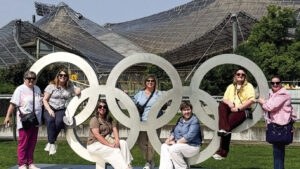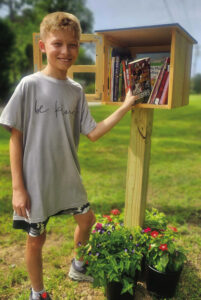Longtime RCS childhood nutrition director prepares for next chapter
When she graduated from Russellville High School in 1976, lifelong Russellville resident Elaine Vaughn didn’t know what path she would ultimately wind up pursuing, but it’s one she recalls fondly as she prepares for her April 1 retirement and gets ready to start her next chapter. Longtime RHS family and consumer science teacher Cindy Coan takes over for her as child nutrition program director for RCS.
“Being the child nutrition director for the past 17 years for Russellville City Schools has been the most rewarding job I’ve ever had,” said Vaughn. “I have loved working with the students, all the school employees and administration.”
After high school, Vaughn attended Northwest Shoals Community College then the University of North Alabama, graduating with a degree in business education. She first worked as a hospital dietary secretary, becoming the assistant dietary director after six months, when the former director left. She took courses from the University of Florida to get the necessary certifications for food service. “I was at the hospital for 13 years, and then I went into human resources,” Vaughn explained, “and when my current job became available, I applied.”
Her parents were Odie Hovater and Eloise Hovater. While growing up, Vaughn lived by College Avenue Elementary and walked across the street to go home for lunch each day. One memory that punctuates her high school recollections is when her father passed away during her freshman year. “I have always appreciated how the schoolteachers, principals and counselors took care of me,” Vaughn said. “I know for a fact the difference a school employee can make in a student’s life. I don’t think some of them realize how important they are to their students.” Vaughn explained she has always wanted to give back to her school. “I hope by being the child nutrition director, I have helped some children along the way.”
During her ninth-grade year, she and some other students earned money for lunch each day by helping in the cafeteria. They ate between lunch times, and Vaughn said the lunch ladies always gave them extra food for helping out. “I loved the rolls and cinnamon rolls,” she recalled.
She had just turned 15 when she met and started dating high school sweetheart Mike Vaughn, whom she would eventually marry. At RHS, her now-husband played football and baseball, and she was a cheerleader and a member of the tennis team. “My son, Wes, played football and baseball, and my daughter, Whitney, was a cheerleader,” Vaughn added. “My family bleeds black and gold, and we can say it’s great to be a Golden Tiger.”
It was January 2007 when she started the portion of her career working as the child nutrition director for Russellville City Schools. At that time, the program was serving an average of 2,700 meals a day, including breakfast and lunch and around 61 snacks a day, with an enrollment of around 2,400. Today the program averages more than 4,000 meals per day, including breakfast and lunch and around 330 snacks. The snack program includes sports, tutoring, band and any other activities being held at the schools. This is with an enrollment of around 2,600. “The CNP has been through many changes in the 17 years I have been director.”
In 2007 the child nutrition program received a grant for fresh fruit and vegetables. It was new to the state of Alabama, and RCS was one of the 25 school systems to receive it. The system continued receiving the grant until 2015-2016.“We were able to provide fresh fruits and vegetables for student snacks,” Vaughn said, “and we started having the roasted corn during this time, and the students loved it.”
They received USDA equipment grants for a walk-in cooler, reach-in freezers and coolers and a small van to deliver meals to the pre-kindergarten students. Other grants came from No Kid Hungry, Action for Healthy Kids and the Dairy Alliance.
In 2014, the program was able to purchase an offsite walk-in freezer and put it in a storage building by the bus barn. “The freezer and storage were lifesavers, especially during the COVID years and during the time Crispitos were taken off the state bid,” Vaughn explained. “During COVID, food and paper supplies were hard to come by, so we were purchasing from different vendors and trying to stockpile products we used daily.”
She explained 2012 was when the CNP as they had known it began to change, noting a fruit or vegetable had to be on each child’s tray in order for the program to claim a reimbursable meal. In addition, half of all grains served had to be whole grain; the allowable amount of sodium was lowered; and sugar limits on drinks at the elementary and middle schools went into effect. Milk had to be 1 percent or fat-free. High school could have sweet tea and Gatorade, but the other schools couldn’t. They had to abide by maximum calorie limits for each grade group, and they had to offer red, dark green and orange vegetables each day, as well as a starchy vegetable and legume each week. Nutrient analysis is done on the menus.
“The child nutrition program is highly regulated on what can and can’t be served through the federal government,” she added.
In 2014-2015, the system began “a universal breakfast program at Russellville Elementary, West Elementary and Russellville Middle School. Breakfast was served to every student at no charge,” Vaughn explained. “We feel so strong about students starting their day off with a meal to help them fuel their bodies so the teachers could fuel their minds. It’s hard to learn when you can only think about being hungry.”
In 2016-2017, the RCS CNP was able to become a community eligibility school, a program wherein every student in the system could receive breakfast and lunch at no charge each day. RCS no longer qualified as a CEP in 2019-2020, so Vaughn and her team set out to see if they could qualify for a program to allow their students to continue to eat breakfast and lunch at no charge. After working with the state CNP and USDA, they decided to work on becoming a Provision 2 school.
“This required all students to complete a Free and Reduced Lunch application again, which they had not done for the past four years,” Vaughn explained. “I can’t praise enough the school administration, teachers, secretaries, counselors and staff for working together to receive these applications from our students. If we had not had their support, we would have never been able to go to Provision 2, and I’m happy to say that in 2023-2024, we were able to return to CEP.”
When COVID hit in March 2020, the CNP program faced a new challenge. RCS decided to prepare and serve meals to their students. “We had to come up with a plan – figure out a way we could provide this service to the students,” Vaughn said. “The CNP staff prepared the meals at Russellville Elementary, and then administration and school staff handed the meals out to students and families driving up to the circle at RES, serving 85,218 meals from the middle of March until May.”
During the summer, the CNP has a feeding program to cover the time off. “When I started, we did around 11,000 meals in the summer,” Vaughn noted, “and some of the meals were served at the schools, while others were provided to the city park and recreation program to be served at the recreation centers and both housing projects.” She said this past summer saw 31,519 meals served to students by means of the program.
She said one of her favorite programs has been the annual Thanksgiving meal for the students. “I enjoy that because families come, and we take pictures of the kids, and it’s just a very good community thing. We want everybody to be involved in our school system.”
She’s a member of the Alabama Child Nutrition Program directors and has previously served as both president and vice president. All RCS CNP employees are members of the School Nutrition Association and the Alabama School Nutrition Associates.
“I’ve been able to travel to Washington D.C., to attend the Legislative Action Committee to represent the child nutrition program,” Vaughn explained. “We met with members of Congress and the Senate to discuss issues the child nutrition programs deal with and to ask for support. We have been very fortunate to work closely with Congressman Aderholt, and he has met with us in D.C. and has been to our schools to visit our CNP, visiting on roasted corn day.”
While new challenges with regulation and requirement continue to face CNP each year – “Our food, supply and labor costs have increased greatly, and all CNPs are expected to be self-sustaining, covering all costs, labor, supplies, equipment repairs and food with federal reimbursement and cafeteria sales,” Vaughn explained – CNP workers have a singular focus. Vaughn said they want to make sure students have “nutritious, tasty meals,” adding they just received a new serving line with a fruit bar and salad bar at the high school last year. “The students are loving it,” she explained. “The fruit and salad bar is very costly but worth it if the students will eat it. We realize that lunch and breakfast at school may be the only meals some students have, and we want them to be tasty.”
“I cherish the relationship with the past and present administration and the school board these past 17 years, and I appreciate their confidence in me, letting me pursue these programs that have benefited our students,” Vaughn added. “I’ve always told our CNP staff that they have the hearts of servants/ They go above and beyond every day to make sure our students have breakfast and lunch daily – serving more than 4,000 meals a day, plus snacks. They amaze me, and during COVID, they stepped up, and we didn’t miss a beat.”
Vaughn ends her career on a personal high note. In 2022 she was named the Alabama School Nutrition Association’s CNP director of the year. “That was such a surprise,” she said. “It was very exciting, and it’s a great honor.” Effective April 1, she’ll be retired, but with plenty of plans to keep active and stay open to possibilities as she moves forward.
“I want to be able to do things for a lot of different people,” Vaughn said. Plans following her retirement include playing tennis, traveling, hiking, biking and “whatever comes around.”
She also noted a desire to spend more time with family and friends, including watching her grandson play tennis at Mortimer Jordan. “I look forward to having more time with my church family at North High land Church of Christ.”
Another goal is to spend more time helping animals. “I’m involved with an amazing group of individuals that are working hard to help educate the residents of Franklin County on fostering, spaying and neutering animals,” she explained. “I hope to have more time to devote to this endeavor.”
Vaughn said while these are her current plans, “God may have a different plan, so I’ll just go with it.”










